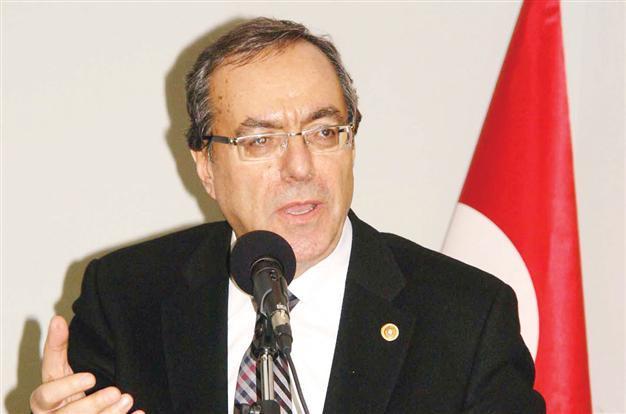Opposition worried over new constitution
ANKARA - Hürriyet Daily News

Republican People’s Party (CHP) deputy Atilla Kart expresses his worries over Turkey’s new charter. DHA photo
Parliament’s Constitutional Conciliation Commission is going to roll into action on May 1 to start penning down the contents of a new constitution. Until that time, however the commission will continue holding meetings under the leadership of the Turkish Union of Chambers and Commodity Exchanges (TOBB) and listen to the views of non-governmental organizations (NGOs), foundations and associations, as well as constitutional institutions.Members of opposition parties that are represented in the Constitutional Conciliation Commission have openly begun speaking of the possibility of the government imposing the contents of the new constitution. This worry has also gained currency in the headquarters of opposition parties. “Lack of confidence” in the government is elaborated as thus:
“The Justice and Development Party (AKP) turned its back on all suggestions brought forth during efforts to frame a new constitution through reconciliation and imposed the amendment on internal regulations. Their draft proposal to enact the transition to 12 years of mandatory education marked the second such occasion where the government forced its will. Prime Minister Recep Tayyip Erdoğan lashed out at the suggestion put forward by the Turkish Industry and Business Association (TÜSİAD,) which he deemed as unacceptable. The government’s attitude which holds all outside suggestions and participation at an arm’s length is serving to broaden the clouds of doubt hanging over the framing of the new constitution.”
Among the figures who have openly voiced this concern was Deputy Atilla Kart of the main opposition Republican People’s Party (CHP).
“The prime minister targeted a non-governmental organization that has expressed its opinion over the fundamental issue of education in a manner that nearly amounted to a threat. This approach presents the greatest obstacle before the writing of the new constitution in a healthy manner that is free from a climate of fear and repression,” Kart said.
The opposition is worried that the AKP could put forward a surprise suggestion to implement a “presidential or a semi-presidential system.” And thus follows their forecast:
“Erdoğan either wants a presidential or a semi-presidential system. He could try to impose this at the last moment by using the writing of the constitution as an opportunity. Even if the opposition objects to it, he can get the people to approve his wish by forcing a referendum, as he did on Sept. 12, 2011.”
THE CHP’S NEW FRONTLINE IMAGE NOT UNTIL SUMMER
ANKARA - Hürriyet Daily News
The CHP’s convention finally took place, and Kılıçdaroğlu made his mark on the party. Rumors of some novel window-dressing followed thereafter. I spoke to a few prominent administrators who said the issue had not come up at the party’s central executive board. Certain figures close to Kılıçdaroğlu have, however, proposed new changes to the board. Kılıçdaroğlu selected board members from the current Party Assembly three times over, and he may be forced to select old names in case of a new possible showcase. He therefore is not thinking about changing the party’s frontline image until the convention in mid-summer. Unless events take a different turn at the last moment, Kılıçdaroğlu will assemble with the new Party Assembly the frontline figures that will carry the CHP into the local elections of 2014. It is said he will patch together a new frontline for the party that includes prominent centrist figures alongside with leftists.
LAYING THE GROUNDWORK FOR DEPUTIES WEARING HEADSCARVES?
ANKARA - Hürriyet Daily News
The Parliament’s Presidency has begun reviewing the case of Merve Kavakçı, just as it decided to pay wages to deputies arrested pending trial. Kavakçı had been elected an Istanbul deputy from the Virtue Party (FP) in 1999. She was prevented from taking the Parliamentary oath on the grounds she was wearing a headscarf, and her citizenship was consequently annulled over the argument she was a citizen of the United States. And thus goes the commentary in the backrooms: “If Parliament accepts Kavakçı as a deputy and restores her personal rights, this would also lay the groundwork for other deputies wearing headscarves. The AKP had nominated a deputy with a headscarf from a place where she could not be elected from during the previous elections. If this path flings open, the MHP would also nominate candidates from places where they could be elected, alongside with the AKP.”











